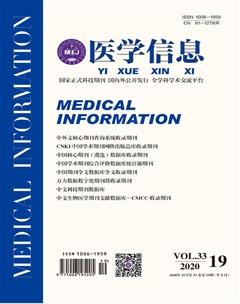腹腔镜下局部进展期胃上部癌的淋巴结清扫的效果分析
张磊 刘云庚 刘 茜 方传发 夏来阳 易建中


摘要:目的 對比分析腹腔镜辅助与开腹手术在进展期胃上部癌中淋巴结清扫的效果。方法 选取2015年5月~2018年12月在我科治疗的44例进展期胃上部癌患者作为研究对象,均行淋巴清扫,根据不同手术方式分为腹腔镜组26例和开腹组18例,比较两组淋巴结清扫数目、术中出血量、手术时间、恢复进食时间、肛门排气时间、术后并发症及1年生存率。结果 两组术中出血量、清扫淋巴结数目方面,差异无统计学意义(P>0.05)。腹腔镜组手术时间、恢复进食时间、肛门排气时间短于开腹组(P<0.05)。腹腔镜组术后并发症发生率为7.69%,与开腹组的11.11%比较,差异无统计学意义(P>0.05)。两组患者手术后均随诊6~24个月,平均16个月,腹腔镜组术后1年生存率为80.77%,与开腹组83.33%比较,差异无统计学意义(P>0.05)。结论 腹腔镜辅助对进展期胃上部癌淋巴结清扫与开腹手术的淋巴结清扫效果相当,但在临床疗效方面具有微创优势并且有利于患者术后恢复,促进患者康复,值得临床应用。
关键词:胃上部癌;进展期;腹腔镜;淋巴结清扫
中图分类号:R572;R656.6+1 文献标识码:B DOI:10.3969/j.issn.1006-1959.2020.19.062
文章编号:1006-1959(2020)19-0188-02
Abstract:Objective To compare and analyze the effect of laparoscopic assisted and open surgery in lymph node dissection in advanced upper gastric cancer.Methods A total of 44 patients with advanced upper gastric cancer treated in our department from May 2015 to December 2018 were selected as the research objects. All patients underwent lymphatic dissection. According to different surgical methods, they were divided into 26 cases in the laparoscopic group and 18 cases in the open group.Compare the number of lymph node dissection, intraoperative blood loss, operation time, time to recover from eating, time of anal exhaust, postoperative complications, and 1-year survival rate between the two groups.Results There was no significant difference in the amount of blood loss and the number of lymph nodes dissected between the two groups (P>0.05). The laparoscopic group's operation time, recovery time, and anal exhaust time were shorter than those of the open group(P<0.05). The incidence of postoperative complications in the laparoscopic group was 7.69%, compared with 11.11% in the open group, the difference was not statistically significant (P>0.05). The patients in both groups were followed up for 6 to 24 months after surgery, with an average of 16 months. The 1-year survival rate in the laparoscopic group was 80.77%, which was not statistically significant compared with 83.33% in the open group (P>0.05) . Conclusion Laparoscopy-assisted lymph node dissection for advanced upper gastric cancer had the same effect as open surgery, but it had minimally invasive advantages in clinical efficacy and was beneficial to postoperative recovery and promotes patient recovery. It was worthy of clinical application.

